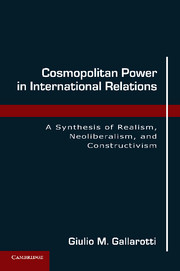 Cosmopolitan Power in International Relations
Cosmopolitan Power in International Relations Book contents
- Frontmatter
- Contents
- Preface
- Introduction
- 1 The Theory of Cosmopolitan Power
- 2 Crucial-Case Textual Analysis of the Founding Fathers of Realism
- 3 Crucial-Case Textual Analysis of the Founding Fathers of Realism
- 4 Case Studies of Soft Empowerment
- 5 Case Study of Hard Disempowerment
- 6 Case Study of Soft Empowerment
- 7 Conclusions
- Appendix Formal Model of Cosmopolitan Power
- References
- Index
Preface
Published online by Cambridge University Press: 05 June 2012
- Frontmatter
- Contents
- Preface
- Introduction
- 1 The Theory of Cosmopolitan Power
- 2 Crucial-Case Textual Analysis of the Founding Fathers of Realism
- 3 Crucial-Case Textual Analysis of the Founding Fathers of Realism
- 4 Case Studies of Soft Empowerment
- 5 Case Study of Hard Disempowerment
- 6 Case Study of Soft Empowerment
- 7 Conclusions
- Appendix Formal Model of Cosmopolitan Power
- References
- Index
Summary
Preface
This book is the second part of a greater project on power. The first part culminated in a book entitled The Power Curse: Influence and Illusion in World Politics (Lynne Rienner Publishers, Inc., 2010). The two parts fit together as an analysis of the cycle of power in world politics. The first book analyzes how nations lose power. Paradoxically, many of the weakening effects that bring about this loss of power inhere in the very process of power augmentation itself. As nations grow stronger, they are systematically plagued with adverse consequences that undermine this strength. In this respect, as much as nations value power, power itself can be a curse. If decision makers are not sensitized to these consequences, and hence do not undertake strategies to limit the effects of these consequences, they may become victims of a power illusion (i.e., their nations will be far weaker than perceived). The present book is a natural corollary to the first. In a world where power is still a principal objective of nations, but the process of power augmentation is both precarious and plagued, how can nations optimize power? This book attempts to provide an answer to this important question. It does so by crossing paradigmatic boundaries to produce a theory of power optimization that combines compelling tenets of the three major paradigms in international politics: realism, neoliberalism, and constructivism. I refer to it as the theory of cosmopolitan power. Such a synthetic theory is necessary to produce a vision of power that best fits the modern world system. Although scholars have found such paradigmatic boundaries difficult to bridge, especially on the issue of power, changes in modern international relations have made such a bridge ever more necessary for the purpose of producing a theory of power that better accords with the state of world politics in our epoch and beyond.
Many individuals have been instrumental in the completion of this book. Their generosity and insightfulness contributed immensely to the content of these pages in one way or another, and hence this book represents a collective effort. I would especially like to thank a number of such individuals: David Baldwin, Lewis Bateman, Philip Cerny, Michael Cox, Douglas Foyle, Gemma Gallarotti, Richard Grossman, Christian Hogendorn, Robert Jervis, Ken Karpinski, David Kearn, David McBride, Joseph Nye, Nicholas Onuf, Peter Rutland, Gil Skillman, Jack Snyder, Elizabeth Trammell, Alexander Wendt, and the anonymous referees of Cambridge University Press and Oxford University Press. I would like to thank Wesleyan University for financial support. Finally, a special thanks goes to my wife Gem and my sons Giulio Christian and Alessio, for not only being constant inspirations, but also for the innumerable ways they have filled my life.
- Type
- Chapter
- Information
- Cosmopolitan Power in International RelationsA Synthesis of Realism, Neoliberalism, and Constructivism, pp. ix - xPublisher: Cambridge University PressPrint publication year: 2010
